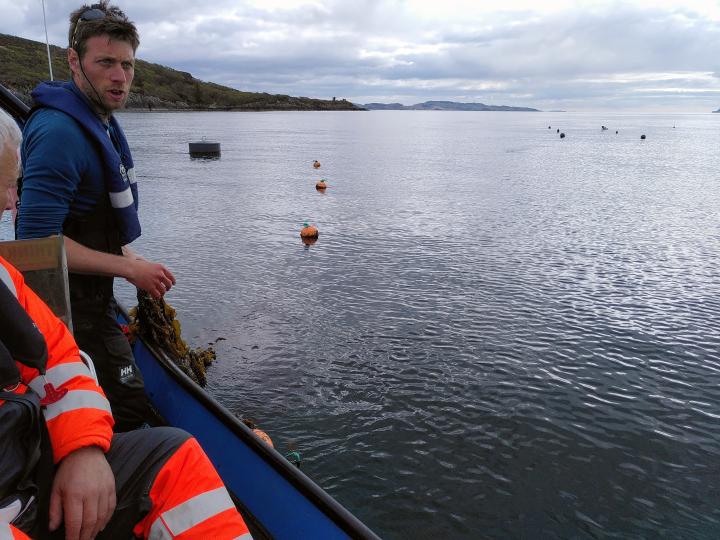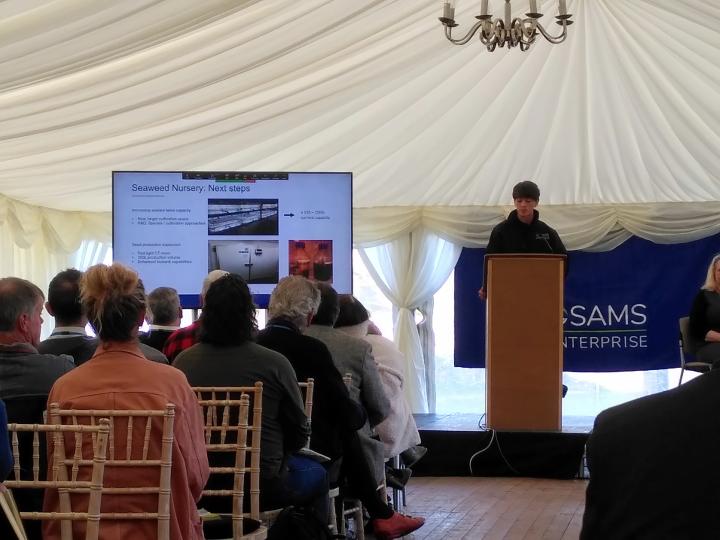Tim's report on the SAMS Seaweed Academy
Tim Regan recounts his recent trip to the Scottish Association for Marine Science in Oban.
6/5/2022
Biologists, economists, and ecologists gathered this year for the grand opening of the Seaweed Academy, a new facility and initiative by the Scottish Association for Marine Science (SAMS). Having previously established on-site farms and nurseries for seaweed, SAMS' new venture is of interest to aquaculture researchers in Scotland and beyond.
Tim Regan, a postdoctoral research fellow with a background in bioinformatics and metagenomics, travelled to the launch event for the Seaweed Academy to hear about the ongoing work at SAMS.
Scottish seaweed and new avenues for aquaculture
Report by Tim Regan
I arrived on Monday to the Scottish Association for Marine Science (SAMS) campus, just outside Oban on the west coast of Scotland. It was sunny and relatively calm, which was fortunate as I was given a boat tour of the SAMS experimental seaweed farm. Dr Kati Michalek explained the layout of the farm; it is roughly 1 hectare in size and is divided into quadrants to enable testing and optimisation of different growing practices simultaneously. She also introduced the concept of Integrated Multi-Trophic Aquaculture (IMTA), which they are trialling by using floating oyster baskets instead of buoys for the lines holding the seaweed. Oysters filter feed on microalgae which can compete for nutrients with the farmed kelp. They can also provide more nutrients to the growing kelp.
Dr Adrian MacLeod led the second part of the tour, explaining the importance of practical solutions such as using the best knots or line layouts and ensuring the materials used were both affordable and sustainable. He also demonstrated their many sensors which monitor factors like sunlight, wavelength, salinity, and temperature—gathering data for their experiments and optimisations.

The second day featured the grand opening of the Seaweed Academy by Rhianna Rees, Seaweed Academy Coordinator, and Laurence Rockey, Director of the Secretary of State for Scotland. This was followed by a series of talks on the historical importance of seaweed in Scotland as fertiliser, including its use by Vikings as a source of vitamin C to avoid scurvy on long sea voyages. An overview of the research being carried out at SAMS featured topics such as ecosystem service measurement by Dr Adam Hughes, SAMS seaweed nursery management by Callum O'Connell and cutting-edge cultivation experiments by Dr Adrian MacLeod and Dr Kati Michalek.
The afternoon featured several practical reports on issues with funding, licensing and processing. However, there were also wonderful success stories like that of the South West Mull and Iona Development (SWMID) community farm presented by Morven Gibson. The days’ talks (and an ensuing pub quiz) prompted lots of interesting discussions with a diverse mix of practicing and prospective farmers, processing plant managers and molecular biologists. Lots of ideas were floating around and it is clear that there is momentum behind the seaweed farming revolution. While there are still many challenges ahead, this event was a firm demonstration of the diversity of expertise being applied to overcome them.

You can read more about Tim's background and research via his People page.

